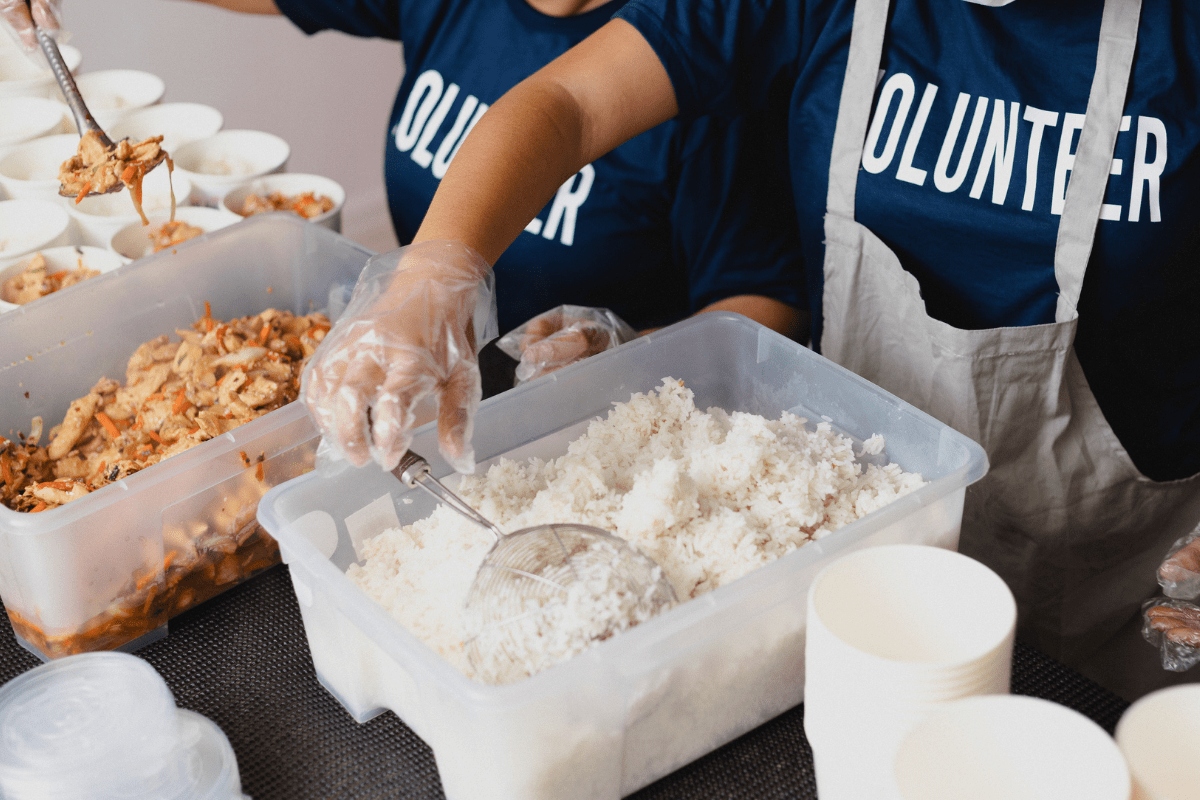Looking to give back in the Tri Cities but not sure where to start? You're definitely not alone… and honestly, that's totally normal when facing what feels like a million different ways to help out. The good news is that this region has one of the most volunteer-friendly communities you'll find anywhere, with nearly 100,000 people already pitching in and creating about $255 million worth of community impact each year.
Getting started doesn't have to be overwhelming
Let's be real here. The hardest part about volunteering isn't actually doing the work… it's figuring out what the heck you want to do and where to do it. I mean, do you want to work with kids, help feed people, walk dogs, or maybe use those Excel skills you've been complaining about at work for something actually meaningful?
Start with some honest self-reflection. What gets you fired up? What makes you want to throw your phone across the room when you see it on the news? That emotional response is usually pointing you toward causes that matter to you personally. Also, be brutally honest about your schedule. If you're already running around like a chicken with its head cut off, maybe don't commit to a weekly four-hour shift just yet.
The research phase is actually kind of fun once you get into it. VolunteerMatch.org works like a dating app for do-gooders, letting you filter by location, cause, and time commitment. JustServe.org updates their listings regularly and welcomes everyone regardless of religious background. And if you want the local insider track, call the United Way of Benton & Franklin Counties at (509) 783-4102. They're basically the volunteer matchmakers of the region.
Here's something nobody tells you upfront though. The whole process from "hey, I want to volunteer" to actually showing up and doing something useful typically takes six to eight weeks. Between applications, background checks, and training, it's not exactly instant gratification. But trust me, that wait time weeds out the people who aren't serious, so you'll be working alongside folks who actually want to be there.
The background check situation (it's not as scary as it sounds)
Okay, let's address the elephant in the room. Yes, many volunteer positions require background checks, especially if you'll be working with kids, vulnerable adults, or in healthcare settings. No, this doesn't mean they think you're a criminal. It's just responsible organizational behavior, kind of like how you lock your car even though you don't expect anyone to steal it.
Washington State makes this pretty painless through their WATCH database system. If a nonprofit sponsors you, it's free and takes about one to two weeks. If you've lived outside Washington recently, you might need a national check that costs $21 to $35 and processes within three to five business days. Most established organizations will cover these costs because they understand that asking volunteers to pay for the privilege of helping is… well, kind of backward.
If your volunteer role involves any driving, you'll also need an MVR clearance showing you have a valid license and haven't been collecting speeding tickets like Pokemon cards. Again, totally reasonable when you think about it.
Major players where you can actually make a difference
The United Way sits at the center of everything at 401 N. Young St. in Kennewick. These folks aren't just about the annual workplace campaigns you might remember from previous jobs. They're coordinating volunteers for everything from their Festival of Trees Gala to mentoring middle schoolers who are chronically absent from school. In 2023 alone, they helped 48,000 people and distributed over $775,000 in grants to local nonprofits. Their volunteer commitments range from literally 30 minutes to year-round involvement, so there's probably something that fits your schedule.
Social services that actually need you
The Tri-City Union Gospel Mission in Pasco runs the area's only homeless shelter, and their numbers are pretty staggering. They serve 236,000 meals and provide 43,600 nights of shelter every year. That's not just statistics… that's someone's dad getting a hot meal, or someone's sister having a safe place to sleep.
Volunteers help with chapel services, kitchen work, food pantry organization, and sorting donations. They also pack community food boxes every Wednesday evening, which has become surprisingly popular because it's social, purposeful, and doesn't require a huge time commitment. The application process involves three steps including a background check, and they typically get back to you within five business days.
Second Harvest operates out of their Pasco facility on Burlington Loop and moves serious weight. We're talking over 2 million pounds of food monthly, serving 55,000 people weekly through 250-plus partner organizations across 26 counties. The work ranges from sorting and packing food to helping with Mobile Market distributions and driving delivery routes. They especially need people with warehouse experience or commercial driving licenses, but they'll train motivated volunteers for most positions.
Healthcare volunteering (scrubs not required)
Kadlec Regional Medical Center welcomes volunteers as young as 15 for roles like staffing information desks, supporting surgical waiting rooms, transporting patients, and running the gift shop. The hospital originally opened in 1944 specifically for Hanford workers, so there's some cool local history baked into the place.
Trios Health and other healthcare facilities typically expect four-hour weekly shifts with six-month minimum commitments. That sounds like a lot, but healthcare volunteers often say the time flies because you're genuinely helping people during some of their most vulnerable moments.
Finding your niche based on what you actually enjoy
Working with kids and education
The Children's Reading Foundation runs Team READ tutoring for K-3 students, providing one-on-one reading support that literally changes the trajectory of a kid's educational experience. If you've ever wondered whether volunteering actually makes a difference, this is where you can see direct, measurable impact.
Boys & Girls Clubs operates 12 sites throughout Benton and Franklin Counties with over 1,200 hours of programming weekly. They need help with youth mentoring, recreation support, and special events. The Arc of Tri-Cities serves over 2,000 individuals annually through programs including Special Olympics coordination and summer camps for children with disabilities.
Even the school districts welcome classroom volunteers, though they usually require background checks and have specific training requirements.
Environmental and agricultural opportunities
The WSU Extension Master Gardener Program trains 40 to 50 new volunteers annually through a comprehensive January-to-May program. These aren't just weekend hobby gardeners… they're developing community gardens, teaching water conservation, managing invasive species, and creating food gardens for low-income families. It's like getting a master class in sustainable agriculture while helping your community.
Fields of Grace has gleaned 2.5 million servings of fresh fruits and vegetables from local farms for food banks. Harvest season volunteering welcomes all ages and provides a direct connection to the region's agricultural heritage.
Unique stuff you won't find everywhere else
Here's where the Tri Cities gets interesting. Because of our scientific and historical background, we have volunteer opportunities that are pretty much nowhere else. The Naval Air Station Control Tower preservation project transforms a WWII-era Hanford Site aviation landmark into a museum through Friday and Saturday work parties. You're literally preserving a piece of nuclear history that most people don't even know exists.
Columbia Basin Dive Rescue provides 24/7 emergency response across 4,000-plus square miles of engineered water systems. This isn't casual weekend stuff… these volunteers are responding to actual water emergencies and saving lives.
Schedule options that work with real life
Not everyone can commit to the same level of involvement, and that's perfectly fine. Organizations have figured this out and offer various commitment levels:
Flexible time commitments:
- One-time special events
- Monthly recreation programs
- Weekly regular shifts
- Seasonal harvest activities
- Virtual opportunities from home
One-time commitments work great for people who want to help but can't do regular scheduling. Special events, park beautification projects, and holiday gift drives let you contribute without ongoing obligations.
Weekly commitments like hospital shifts or meal delivery routes provide consistency that organizations love and volunteers often find surprisingly rewarding. There's something to be said for showing up regularly and becoming a familiar face.
The coolest development has been virtual volunteering options. About 18% of volunteers now participate virtually, which expanded significantly after COVID and continues growing. This works especially well for people with transportation challenges, health concerns, or just prefer working from home.
The practical stuff nobody warns you about
Legal protection and insurance
Washington State law provides liability protection for volunteers acting within their assigned duties, and organizations are required to carry public liability insurance. Your personal auto insurance generally covers volunteer driving, though you should verify this with your provider because insurance companies can be… creative… with their interpretations.
Money matters
Most organizations reimburse mileage at the IRS standard rate, which is currently 67 cents per mile. They'll also typically cover parking fees, required training materials, and sometimes background check fees. While you can't deduct volunteer hours on your taxes, out-of-pocket expenses including mileage may qualify for deductions. Consult a tax advisor because tax law makes about as much sense as trying to assemble IKEA furniture using only the pictures.
Organizations usually provide free parking, basic tools and safety equipment, uniforms when needed, and name tags for identification. These little details matter more than you might think when you're starting out.
Training expectations (spoiler alert: it's actually useful)
Basic orientations typically last two to four hours and cover organizational missions, policies, safety protocols, and facility tours. It sounds boring, but honestly, it's usually pretty interesting to learn how these organizations actually work behind the scenes.
Specialized training varies wildly depending on what you're doing. Healthcare settings require HIPAA training and TB testing. Youth programs mandate reporter training. Emergency services often require CPR certification. The WSU Master Gardener program involves 40-plus hours of education, but you're basically getting a college-level course in sustainable agriculture for free.
Training time expectations:
- Basic orientation: 2-4 hours
- Healthcare roles: HIPAA plus TB testing
- Youth programs: Mandatory reporter training
- Master Gardeners: 40+ hour certification
- Emergency services: CPR certification required
Guardian Ad Litem volunteers complete 30-plus hours of preparation, which makes sense when you consider they're advocating for children in court proceedings.
Current challenges and future opportunities
Let's be honest about the current situation. Nearly half of nonprofit CEOs report volunteer recruitment as "a big problem," which represents a 62% increase since 2003. Competition for volunteers among organizations is intense, and some volunteers get recruited away by other organizations or hired into paid positions.
However, the Tri Cities has some unique advantages moving forward. One-third of Hanford's workforce is eligible for retirement within five years, and these are typically well-educated, financially stable individuals who might be interested in community service. The region's average wages of $97,000 provide financial stability that supports volunteering.
The pandemic actually led to some positive innovations. Virtual volunteering expanded accessibility for people with transportation or health limitations. Organizations got better at flexible scheduling and skills-based matching. Corporate partnerships strengthened through programs like PNNL's Galaxy system.
Success stories from real people
Energy Northwest employees raised over $78,000 for United Way in their workplace campaign. PNNL's Team Battelle has contributed more than 500,000 volunteer hours since 1999, focusing on STEM education and community programs that leverage the region's scientific expertise.
A parent benefiting from Dolly Parton's Imagination Library, distributed locally by United Way, shared: "It helped my daughter develop her social skills and language. Her language development was hugely impacted… It creates memories." The Tri-City Union Gospel Mission has strengthened 1,000 families and helped 3,000 individuals, with one client simply stating, "I'm thankful for being alive."
These aren't just feel-good stories. They represent measurable community impact that happens because people decided to show up and help out.
Taking the next step
Post-COVID volunteering numbers show encouraging signs. National formal volunteering rebounded from 23.2% in 2021 to 28.3% in 2023. The Tri Cities consistently performs above national averages with a 32.8% volunteer participation rate compared to 30.7% nationally.
The region offers exceptional opportunities that reflect our unique identity while addressing diverse community needs. From preserving scientific heritage to supporting agricultural initiatives, from leveraging technical expertise to embracing wine country culture, volunteers engage in meaningful work that strengthens community bonds.
Start with one organization that resonates with you. Make that phone call. Fill out that application. Show up for the training. The six-to-eight-week timeline from interest to active service might seem long, but it ensures you'll be prepared and matched with something that actually fits your interests and availability.
Whether you contribute 30 minutes or 30 hours monthly, every volunteer helps write the next chapter of this community's remarkable service story. And honestly, you might be surprised by how much you get back from the experience.





